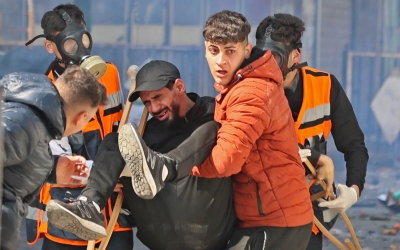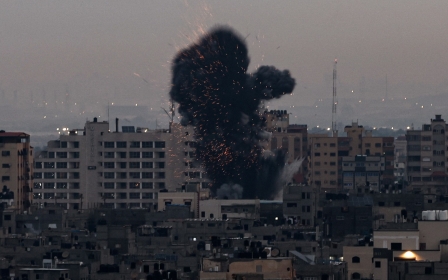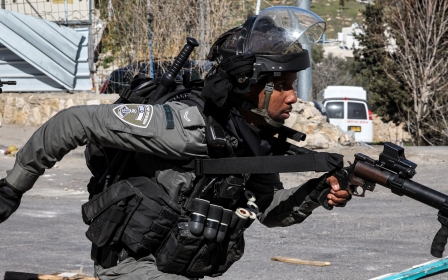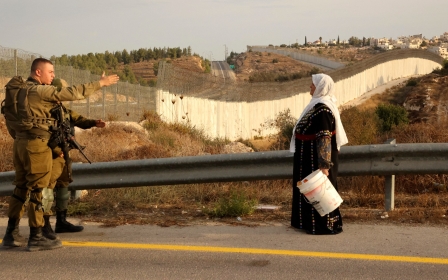A Palestinian man died in this medic's arms. Then he realised it was his father
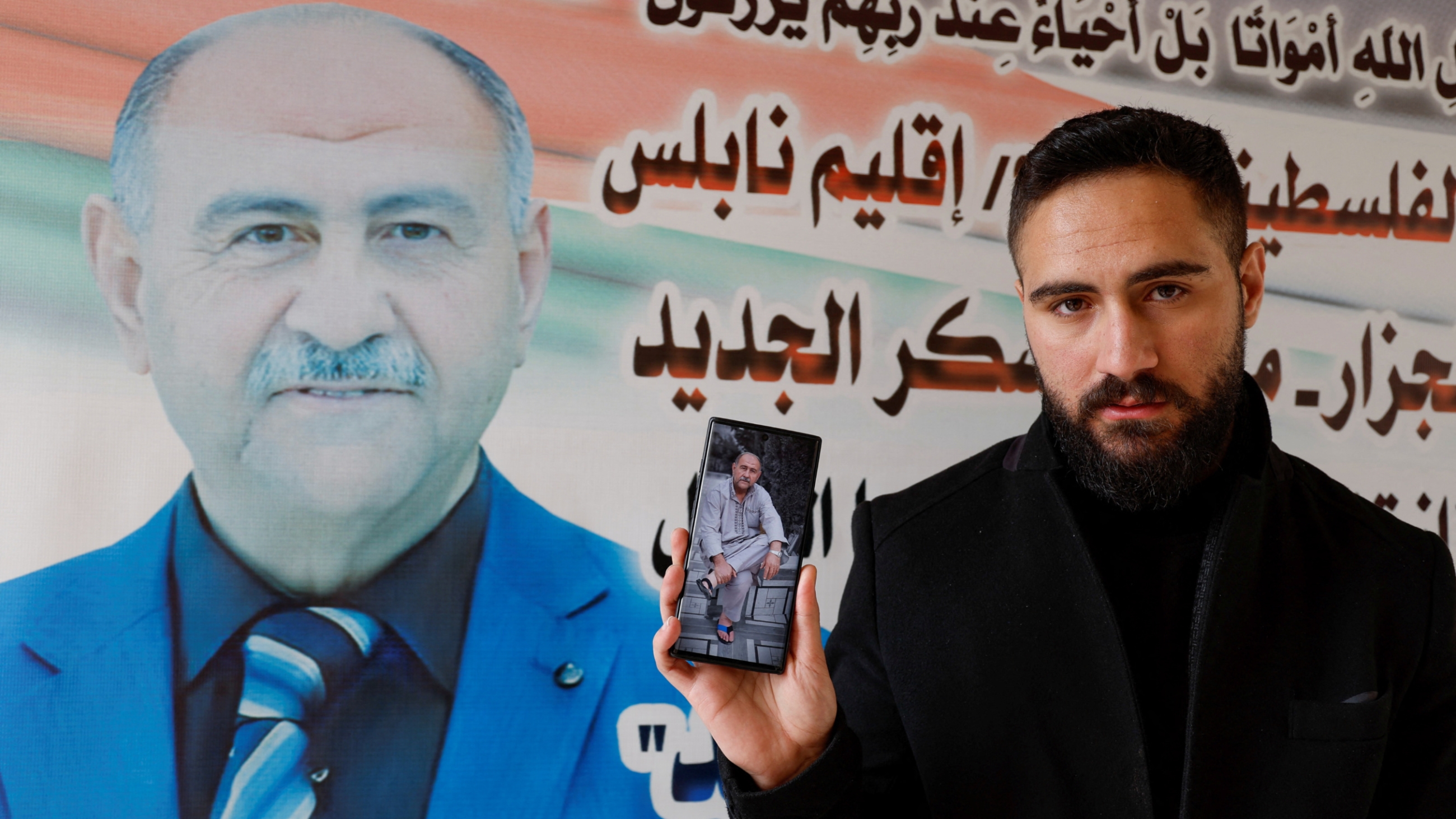
A gut wrenching cry cut through the chaos that had invaded the emergency room of al-Najah Hospital in Nablus following a deadly Israeli military raid on the old city that morning.
"This is my father," nurse Elias al-Ashqar yelled as he recognised the familiar features of the blood-streaked face of the man that he and his medical team had just failed to revive.
"When we heard the code blue, Elias and I went to the emergency room and tried to resuscitate [two of the] wounded without looking at their faces. In these situations, we only care about helping the patient as fast as we can," Ahmed al-Aswad, the chief of the cardiac intensive care and Ashqar's close friend, told Middle East Eye.
"When all attempts failed and the time of death was announced, Elias looked at the man's face and yelled out my name at the top of his lungs: Aswad, this is my father!"
Abdel-Hadi, 61, was among 11 Palestinians killed by Israeli forces during the four-hour raid on the occupied West Bank city on Wednesday.
New MEE newsletter: Jerusalem Dispatch
Sign up to get the latest insights and analysis on Israel-Palestine, alongside Turkey Unpacked and other MEE newsletters
Elias' shock was felt by his medical team. Aswad held up the ID card belonging to Abdel-Hadi al-Ashqar in his friend's face and asked: "Are you sure this is your father?"
"Elias said 'yes', and a terrible silence fell on the emergency room," Aswad said.
"We are still trying to wake up from this nightmare."
Abdel-Hadi al-Ashqar had been in the eastern market of Nablus when more than 60 Israeli military vehicles stormed the city late on Wednesday morning. He sustained a shrapnel wound to the heart.
A battlefield
Earlier that day, the Old City's eastern market had been going about its usual peak time business.
Fruit and vegetable stalls were spread out for Palestinian housewives and elderly retirees on their daily shopping visits. Alternatively, shoppers might have been sitting with their friends at one of the cafes in the area.
'Elias said yes, and a terrible silence fell on the emergency room. We are still trying to wake up from this nightmare'
- Ahmed al-Aswad, doctor
None of these regular visitors had expected that the market, a scene alive with the voices of sellers and buyers haggling over prices, would soon turn into a battlefield.
Around 10 am, undercover Israeli special forces - some in plainclothes, others disguised as clergy or in women's clothing - entered the market carrying large rolls of carpets in which they had hidden their weapons, and headed to the Grand Salahi Mosque, according to eyewitness accounts.
Soon after, eyewitnesses said the special forces left the mosque and moved, weapons drawn, towards a neighbouring building that reportedly housed Palestinian resistance fighters.
Soon these Israeli forces, joined by large military reinforcements, had besieged the house, firing missiles at the building, while Israeli snipers were seen stationed in the surrounding area.
A military helicopter was also spotted flying over the city.
In some areas, residents were now confronting Israeli forces, while in others, armed clashes were taking place between resistance fighters and Israeli troops.
Israeli forces killed six fighters from local armed groups, including from the Lions' Den, as well as a 16-year-old boy, and three elderly men.
As soon as the reports of the raid first came out, the director of emergency response at the Red Crescent in Nablus, Ahmed Jibril, immediately dispatched ambulances to the area.
But they found it under siege, with the Israeli military blocking all entry points.
"Meanwhile, the occupation forces prevented medical staff from reaching the wounded, and even targeted them with live bullets and tear gas," he told MEE.
Jibril said Israeli forces prevented a team from reaching and evacuating a child suffering from a heart condition.
The Israeli military also targeted ambulances with tear gas drones, making it even more difficult to evacuate the wounded they were able to reach.
Some medics were forced to evacuate the wounded on stretchers on foot despite the risks to the patients.
At least 102 Palestinians were wounded, including three journalists, with 82 people suffering gunshot wounds.
'The heart is heavy'
Medics and relatives Mohammed and Khaled Baara were racing against the clock as they evacuated an elderly man who was hit by a sniper in the neck, waist, and feet.
"We evacuated the man with complete difficulty, as snipers were firing in our direction. But his wounds were fatal. The sniper wanted to kill him without a doubt," Mohammed said.
It wasn't until they reached the hospital that they realised with surprise that the elderly man was their relative, Adnan Baara, after seeing his ID Card.
"In cases like these, we do not easily recognise the martyrs because their faces are covered in dust or stained with blood, just like what happened with Baara," he said.
Mohammed, who also works at a shop in the area, treated dozens of elderly people who were at the Eastern Market on Wednesday morning.
Adnan Baara was on a visit to the municipality moments before he was killed. The third elderly man, Anan Enab, died later that night from tear gas inhalation.
The Israeli military said it conducted the operation in Nablus to arrest three people for allegedly planning and carrying out attacks against Israeli targets in recent months.
It added that it shot back after coming under fire and after people threw explosives and Molotov cocktails toward troops.
Israeli forces used drones, missiles, snipers, live bullets, and gas bombs, leaving the market and surrounding area in ruins.
"As an ambulance officer who has worked in conflict areas for years, we always think that we are used to these scenes but the feelings of anger and sadness are renewed with every wounded and martyr," Mohammed said.
"And by the end of the day, the heart is heavy."
Middle East Eye delivers independent and unrivalled coverage and analysis of the Middle East, North Africa and beyond. To learn more about republishing this content and the associated fees, please fill out this form. More about MEE can be found here.


